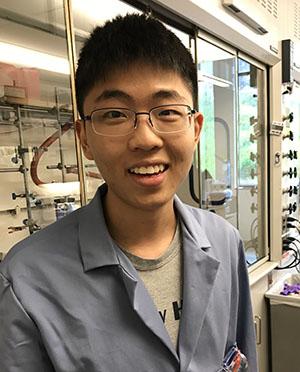Image courtesy of Tiger Zhang
Murmurs of delighted background conversation permeate the JE Common Room as Tiger Zhang (JE ‘20)—chemistry major, Phi Beta Kappa academic honor society member, and undergraduate researcher—speaks about what drew him to the realm of science research in the first place. “The idea of finding something new has always excited me. Getting into research felt natural. I wanted to apply what I had learned in the classroom and try to see how science really worked through the process of discovery,” Zhang said.
Zhang’s journey along this path of discovery has been an eventful one. This past summer, Zhang completed an immunology research project at the Memorial Sloan Kettering Cancer Center (MSK), a project which earned him the first place in the hard science and medicine category at the recent 2019 Yale Undergraduate Research Symposium. His MSK research originated from a long-standing interest in immunology. “I had always been interested in viruses and bacteria and parasites. Early on, I remember reading a book called Parasite Rex by Carl Zimmer about how certain parasites can do really weird things,” Zhang said. Zhang recalls a certain species of parasitic worm that, if eaten, could ease the symptoms of autoimmune diseases. “I thought anything that was really weird was really cool.”
In taking part in immunology research at MSK, Zhang had the chance to explore a new area of science. He studied a type of immune cell called a natural killer cell. When body cells become infected with a virus, natural killer cells proliferate at an accelerated rate, combatting the invading virus by killing infected cells. Zhang was interested in investigating if there were other cells aiding natural killer cells in their accelerated division. He and his fellow researchers ultimately identified CD8+ T Cells, a different type of immune cell, as one such helper. Importantly, natural killer cells also have the ability to kill tumor cells. “A better understanding of natural killer cells could, in turn, lead to the development of a natural killer cell immunotherapy, where natural killer cells could be harnessed to target cancer cells. We might be able to treat cancer that way,” Zhang said.
Currently, Zhang is a member of the Miller Lab at Yale, a chemistry laboratory whose main research focus is studying how we can expedite chemical reactions through the addition of certain substances, called catalysts. Zhang joined the lab following his sophomore year, a decision which stemmed from his interest in organic chemistry. “I always liked chemistry, but I liked organic, in particular,” said Zhang. He was drawn to organic chemistry’s intuitiveness—it allows us to explain how reaction mechanisms work, step by step, and rationalize behaviors of tiny molecules based on just a few concepts. His current research with Margaret Hilton, a postdoctoral fellow in the lab, relates to the development of peptide catalysts. The implications of his research at Miller Lab are significant. “They could, potentially, be used to develop more effective antibiotics or anti-cancer drugs,” Zhang said.
When asked about his plans for the future, Zhang said “Hopefully, graduating.” He also hopes to eventually pursue an M.D. or combined M.D./PhD degree. Long term, he is considering engaging in the research and development of cures for different autoimmune diseases that, currently, don’t have very effective treatments.
For future researchers, Zhang notes the importance of being driven by true interest in your research topic. “The research process can be very tedious, but if you’re passionate about, curious about your research topic, you’ll be more likely to persevere and follow through.” He adds that, for him, the most motivating aspect of research is the process. “The process is what leads to understanding—the process of trying to figure out what’s going on, trying to understand the mechanisms of the natural world better and more deeply.”
For Zhang, the most rewarding aspect of research is the path toward discovery. Driven, fundamentally, by personal interest and curiosity, Zhang hopes to be but a small part of a larger scientific endeavor to tackle disease.

